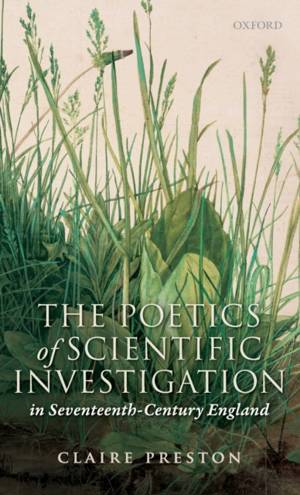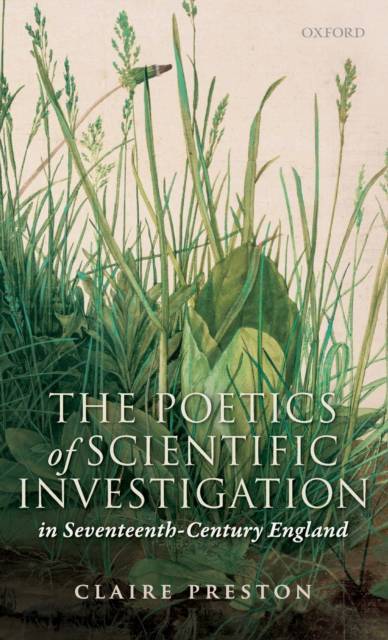
Bedankt voor het vertrouwen het afgelopen jaar! Om jou te bedanken bieden we GRATIS verzending (in België) aan op alles gedurende de hele maand januari.
- Afhalen na 1 uur in een winkel met voorraad
- In januari gratis thuislevering in België
- Ruim aanbod met 7 miljoen producten
Bedankt voor het vertrouwen het afgelopen jaar! Om jou te bedanken bieden we GRATIS verzending (in België) aan op alles gedurende de hele maand januari.
- Afhalen na 1 uur in een winkel met voorraad
- In januari gratis thuislevering in België
- Ruim aanbod met 7 miljoen producten
Zoeken
The Poetics of Scientific Investigation in Seventeenth-Century England
Claire Preston
Hardcover | Engels
€ 257,95
+ 515 punten
Uitvoering
Omschrijving
The writing of science in the period 158-17 is artfully, diffidently, carelessly, boldly, and above all self-consciously literary. The Poetics of Scientific Investigation in Seventeenth-Century English Literature considers the literary textures of science writing - its rhetorical figures, neologisms, its uses of parody, romance, and various kinds of verse. The experimental and social practices of science are examined through literary representations of the laboratory, of collaborative retirement, of virtual, epistolary conversation, and of an imagined paradise of investigative fellowship and learning. Claire Preston argues that the rhetorical, generic, and formal qualities of scientific writing are also the intellectual processes of early-modern science itself. How was science to be written in this period? That question, which piqued natural philosophers who were searching for apt conventions of scientific language and report, was initially resolved by the humanist rhetorical and generic skills in which they were already highly trained. At the same time non-scientific writers, enthralled by the developments of science, were quick to deploy ideas and images from astronomy, optics, chemistry, biology, and medical practices. Practising scientists and inspired laymen or quasi-scientists produced new, adjusted, or hybrid literary forms, often collapsing the distinction between the factual and the imaginative, between the rhetorically ornate and the plain. Early-modern science and its literary vehicles are frequently indistinguishable, scientific practice and scientific expression mutually involved. Among the major writers discussed are Montaigne, Bacon, Donne, Browne, Lovelace, Boyle, Sprat, Oldenburg, Evelyn, Cowley, and Dryden.
Specificaties
Betrokkenen
- Auteur(s):
- Uitgeverij:
Inhoud
- Aantal bladzijden:
- 310
- Taal:
- Engels
Eigenschappen
- Productcode (EAN):
- 9780198704805
- Verschijningsdatum:
- 17/02/2016
- Uitvoering:
- Hardcover
- Formaat:
- Genaaid
- Afmetingen:
- 137 mm x 206 mm
- Gewicht:
- 476 g

Alleen bij Standaard Boekhandel
+ 515 punten op je klantenkaart van Standaard Boekhandel
Beoordelingen
We publiceren alleen reviews die voldoen aan de voorwaarden voor reviews. Bekijk onze voorwaarden voor reviews.









